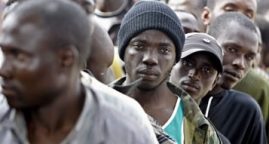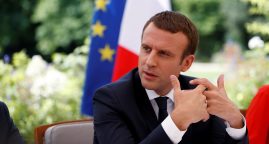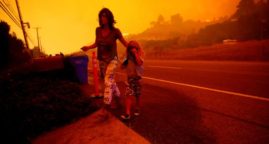Where do we go from here? 1st Annual Grand Bargain Meeting
The one-year anniversary of the Grand Bargain is a time to take stock and look at next steps. It’s our chance to renew our commitment, to assess progress and chart the way forward.
A year ago we gathered to launch this historic agreement and since then, more signatures have been added. Together we were determined to reset our ways of working and refocus our efforts on achieving humanitarian gains.
I’d like to acknowledge the work that has happened up to today. We have seen increased political commitments but we also have seen obstacles in turning commitments into reality. Resetting the course of institutionalized systems is not a straightforward business.
I cannot help but be reminded of Kristalina Georgieva’s passionate words in driving forward this agenda:
“We have a moral duty to recognize that the world has changed, dramatically, whereas our action is falling dramatically behind… Never before have we been so generous; but never before so insufficient. The shortfall is the difference between life and death, and the difference between hope and hopelessness.”
These words capture our challenge. Across the world, we are seeing increasing violence, fragility, vulnerabilities, particularly in urban contexts, as well as protracted conflicts. At the same time, we witness more frequent and severe natural emergencies due to climate change which are negatively compounding on the lives and livelihoods of millions of people.
We cannot afford to forget that the purpose of the Grand Bargain is not efficiency in itself; or a better alignment of bureaucracies. It is to protect and alleviate the deep suffering of all those for whom every day is a struggle for survival.
The challenges thus are manifold:
- How do we best find sustainable streams of finance, so we can scale and better plan our work? This objective has led us to work on better transparency, reduced earmarking and multi-year funding;
- How do we become more efficient and impactful in our service delivery? Reducing duplications, streamlining reporting, expanding cash-based financing and joint and impartial needs assessment have proven to be good entry points;
- How do we avoid being stuck in just aligning bureaucracies, but bring resources and energy to increase impact? and
- How do we bring diverse perspectives together in a way to allow the right balance between alignment and flexibility, consistency and innovation?
Some developments over the past year were particularly encouraging. The leadership of the UN and the World Bank in responding to the breakdown of food security in Yemen, Somalia, South Sudan and the North of Nigeria has demonstrated how to bridge the gap between development and humanitarian perspectives.
I am particularly pleased that a way has been found to have financial support by the Bank for the specifically neutral and impartial way of working in regions difficult to access and outside of government control. This is a positive step where the ambitions of the Grand Bargain have come to fruition in a tangible way.
Humanitarian organizations rely on flexible, un-earmarked funding to respond to victims of conflict whoever they may be and wherever they are, in accordance with the principles of impartiality, neutrality and independence. Important work still needs to be undertaken to move commitments into reality and to grow the level of trust between donors and implementing agencies.
Cash programming
Another area where I have seen the Grand Bargain making a difference on the ground is in cash programming. As we move forward it has obvious that assistance through cash is not a panacea but needs a minimum of markets, freedom of movement for people in need, stability amongst communities, capital and skills of beneficiaries.
Last month I visited an IDP camp in Kachin State, Myanmar and saw how immediate and effective cash transfers can be. ICRC has now dramatically scaled our cash programming to now reach 1.4 million people across 35 countries, as have many other humanitarian agencies. The visit to Myanmar confirmed for me that in other regions, where conflicts amongst communities are in full swing, local markets have difficulty emerging and cash services are not possible or not possible yet.
Across our work, we are reminded that there will never be a one-size-fits-all approach to humanitarian action. The situations we face are complex, difficult, entrenched. And the humanitarian ecosystem is as broad as it is diverse. The challenge before us is to allow for this diversity, build on current strengths as we align processes.
Testing assumptions; building trust
There is an assumption that the humanitarian ecosystem needs to improve measurement and quantify impact, to be more accountable and less bureaucratic. There is also an assumption that donor requirements continue to be burdensome and that earmarking of donations has actually increased.
We need to maintain trust as we are working through assumptions and tensions, if we are to succeed. Monitoring and reporting requirements need to balance donors’ needs to demonstrate impact with fears about whether that information may infringe people’s rights for privacy and confidential use of data for their protection. This is a balancing act of negotiation and cooperation.
Humanitarian and development classifications are blocking progress
For me, changing the way we view humanitarian relief and development is a vital shift that must be further deepened. I am unconvinced though that we are pursuing the right approach and that these classifications mean anything to people caught up in a conflict or disaster.
The terms “humanitarian” and “development” are a structural block to our work. The ICRC and the Red Cross Red Crescent Movement as a whole have been working in many places of protracted conflict, like Afghanistan, Iraq, Yemen, for decades. In Syria a couple of weeks ago I saw the realities of these parallel tracks. In one town close to the frontline, people are forced to flee their homes; yet just kilometers away there are areas of relative tranquillity, where people are moving back and trying to rebuild their lives. One group needs shelter, food, blankets; the other group needs the taps to be turned on, for electricity and medical services to operate.
Together we have to be awake to the reality of what is happening; and to be flexible enough to shift when the demands change.
Understanding people’s needs, complex as they are
We need to be close to people, to understand their needs and be accountable to them, rather than impose a solution. The relationship with people in need is not straightforward.
Needs are simultaneously short as well as medium and long term. They are individual and systemic, they evolve with contexts and with general developments in societies: the spike in educational need in the midst of humanitarian crises or the connectivity needs emerging in present day crises are examples.
We will succeed when we really understand people in need and their strengths, and when we implement responses that bolster resilience and self-reliance as fast and as soon as possible.
Local, national, international
Local actors are a critical part of the response. ICRC benefits from a strong network of National Red Cross Red Crescent Societies and we have been working ‘locally’ for many decades.
We know the benefits local actors can bring, and we also know how important it is that they receive un-earmarked funding, not only for operations, but also to strengthen their capacity.
But we are also cognizant that, especially in conflicts, local actors may face limits and become entangled themselves in conflict. In such highly polarized and volatile contexts, it may simply be too dangerous for local actors to work on sensitive protection issues like torture or enforced disappearances. This is where international actors, neutral, independent and impartial humanitarian organizations like the ICRC, are playing an important and complementary role. As I mentioned earlier, the humanitarian ecosystem is diverse and we need to play to our strengths.
I raise these challenges to assist in your discussions today. The ICRC remains committed to the process and to constructively working through the challenges.
Today is a chance to appraise our progress and to change what is not serving us. The danger is that our commitments remain words on a page.
I’d like to invite you, in your discussions to:
- Be ambitious on managing this process; the process needs leadership and engagement by all stakeholders. If we want to move forward during the second year, we need to improve on both;
- Be smart in building efficiency while creating meaningful and innovative services;
- Be committed to transparency and accountability – they are essential for trust-building;
- Be vigilant on unnecessary bureaucracy and do everything to prevent the Grand Bargain to become itself a bureaucratic exercise. Concentrating on people in need may be the best way to avoid such danger;
And above all… be focused on humanitarian gains, on the 125 million people who are counting on us to get it right.
Related Articles
IOM Learns of ‘Slave Market’ Conditions Endangering Migrants in North Africa
04/11/2017. Over the past weekend, IOM staff in Niger and Libya documented shocking events on North African migrant routes, which they have described as ‘slave markets’ tormenting hundreds of young African men bound for Libya.
Macron pledges pragmatism and cooperation with post-Brexit Britain
06/21/2017. In his first interview, Emmanuel Macron sets out his international agenda on Syria, Trump, and European integration.
Extreme weather hit 60 million people in 2018, no part of the world spared
01/24/2019. The study showed that earthquakes and tsunamis claimed more lives than any other type of hazard.





